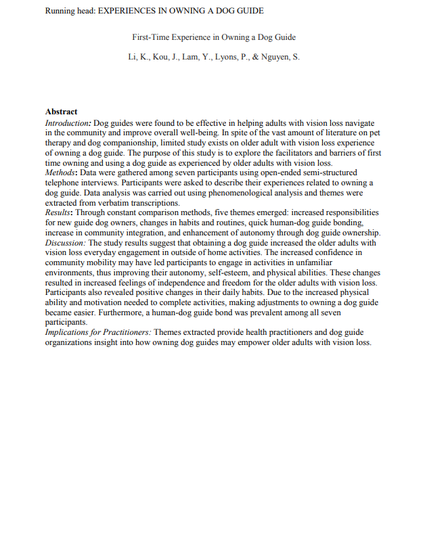
Introduction: Dog guides were found to be effective in helping adults with vision loss navigate in the community and improve overall well-being. In spite of the vast amount of literature on pet therapy and dog companionship, limited study exists on older adult with vision loss experience of owning a dog guide. The purpose of this study is to explore the facilitators and barriers of first time owning and using a dog guide as experienced by older adults with vision loss.
Methods: Data were gathered among seven participants using open-ended semi-structured telephone interviews. Participants were asked to describe their experiences related to owning a dog guide. Data analysis was carried out using phenomenological analysis and themes were extracted from verbatim transcriptions.
Results: Through constant comparison methods, five themes emerged: increased responsibilities for new guide dog owners, changes in habits and routines, quick human-dog guide bonding, increase in community integration, and enhancement of autonomy through dog guide ownership.
Discussion: The study results suggest that obtaining a dog guide increased the older adults with vision loss everyday engagement in outside of home activities. The increased confidence in community mobility may have led participants to engage in activities in unfamiliar environments, thus improving their autonomy, self-esteem, and physical abilities. These changes resulted in increased feelings of independence and freedom for the older adults with vision loss. Participants also revealed positive changes in their daily habits. Due to the increased physical ability and motivation needed to complete activities, making adjustments to owning a dog guide became easier. Furthermore, a human-dog guide bond was prevalent among all seven participants.
Implications for Practitioners: Themes extracted provide health practitioners and dog guide organizations insight into how owning dog guides may empower older adults with vision loss.
Available at: http://works.bepress.com/kitsum_li/91/
